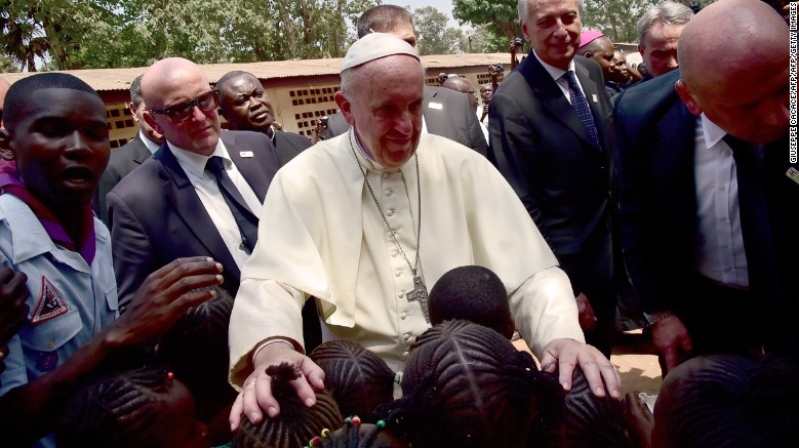
Pope Francis ended his six-day trip to Africa by delivering a poignant speech in which he called for unity among religious groups, arguing that religious conflicts simple spark civil war, terrorism and suffering throughout the continent.
"Together we must say no to hatred, to revenge and to violence, especially violence perpetrated in the name of a religion or of God himself," the pope said in Bangui, the capital of Central African Republic, BBC News reports.
After celebrating mass at a stadium in Bangui, the pontiff visited the Koudoukou mosque, where he addressed Muslims who had sought shelter in the capital after years of violence between Christians and Muslims.
"Christians and Muslims are brothers and sisters," he told the crowd. "We must therefore consider ourselves and conduct ourselves as such."
The AP notes that Francis also spoke about the violence between Christians and Muslims that erupted when rebels ousted the Central African Republic's president three years ago, which left around 6,000 dead and thousands displaced.
"My wish for you and for all Central Africans is peace," he said.
Francis' speech echoed remarks given in Kenya a week prior, where he encouraged a group of Catholic youths in Nairobi to strive for unity.
"Tribalism. It can destroy. It can mean having your hands hidden behind your back and having a stone in each hand to throw to others," he said. "Kenya is a young and vibrant nation. Cohesion, integration, and tolerance towards other people must be a primary goal."
The pope charged that love can squelch the kind of hatred that tribalism and sectarianism creates.
"You can ask yourself: Is this path to destruction or is it an opportunity to overcome this challenge for me, my family and as a member of this country," asked Pope Francis. "We don't live in heaven, we live on earth and earth is full of difficulties. You have the capacity to choose which path you want to follow, the path of opportunity or of division."
The pope also toured Uganda, where he visited a shrine that memorializes the 19th-century Christian martyrs who were burned alive for their faith.
The martyrs were bold and courageous in bringing Christ to others, even at the cost of their own lives, said Francis.
"My visit to your country is first to commemorate the canonization of Uganda's martyrs," he told thousands who joined him at the shrine. "The Christian community in Uganda grew strong through the martyrs."
According to the Pew Research Center, Africa has the fastest-growing population of Catholics and Muslims in the world, with both Islam and Christianity expected to have more than twice as many adherents in the region by 2050 as they did in 2010. Critics say Francis' visit to Africa was particularly powerful, as he is the first pope in modern history to travel to a war zone.
"This trip, in many ways, has captured all of the core themes of Francis' papacy in miniature, from war and peace to interreligious dialogue to the environment to his passion for the poor," said CNN senior Vatican analyst John Allen.
"In terms of insight into Francis' heart and mind, I think this journey has been remarkable."
"The pope's visit was significant to Africa, especially to our leaders and the church," added Zacharia Wanakacha Samita, a professor at Kenyatta University in Nairobi, Kenya.
"It's time we need to come together and reflect on the things that affect us Africans," he continued. "We have just realized that we have the capacity to deal with our own issues like corruption, terrorism and tribalism. Religion has power to unite Africans ... What our leaders can do to honor the pope's visit is to deal with these issues."







